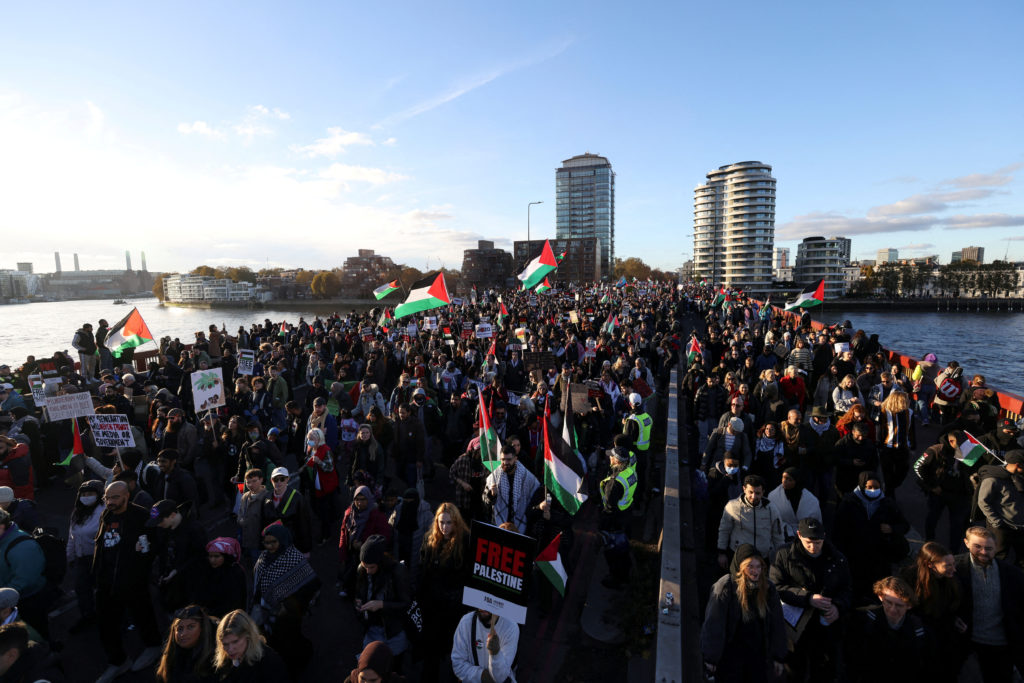London, UK – A massive protest in Parliament Square, Westminster on Saturday turned tense after more than 425 people were arrested for defying the government’s ban on the campaign group Palestine Action. The demonstration, which began at 1:00 PM with Big Ben’s chimes, drew an estimated 1,500 protesters, including pensioners, activists, and campaigners from across the country.
Why the Protests Erupted
In July 2025, the UK government proscribed Palestine Action under the Terrorism Act, making it a criminal offence to support or hold membership of the group. Anyone convicted could face up to 14 years in prison. Critics argue this move is an attack on freedom of speech and the right to peaceful protest.
Saturday’s rally was organised by Defend Our Juries, which urged people to hold up placards and pieces of paper in solidarity with Palestine Action. Slogans such as “I oppose genocide, I support Palestine Action” were widely seen in the crowd.
Police Response and Heavy Arrests
According to the Metropolitan Police, most arrests were made for supporting a banned organisation, while over 25 people were taken into custody for assaulting officers and public order offences.
The Met reported that officers faced “an exceptional level of abuse”, including punches, kicks, spitting, and objects being thrown. They added that there was a “coordinated effort to overwhelm the justice system”, forcing officers away from local neighbourhoods to manage the protest.
Protesters, however, accused the police of using excessive force. Defend Our Juries shared a video showing an elderly protester being shoved to the ground. The group claimed police had “violently assaulted peaceful demonstrators, including pensioners,” while attempting to arrest hundreds for holding cardboard signs.
Protest Atmosphere in Parliament Square
The protest site carried historic symbolism, with many arrests taking place between the statues of Mahatma Gandhi and Millicent Fawcett, both iconic figures of peaceful resistance.
-
Some protesters followed organisers’ advice to go “floppy” during arrests, making it harder for police to remove them.
-
Crowds frequently shouted “shame on you” and accused police of “supporting genocide.”
-
Police vans lined Millbank Road, where detainees were processed and transported.
Among those arrested were elderly campaigners and disabled activists. 79-year-old Margaret from Dorset said:
“The law is ridiculous. We’re called terrorists, and it’s absolutely stupid. It never should have been done.”
Another protester, a young man, said he was ready to face a terrorism conviction, adding:
“I’m young. I’m quite happy to accept the consequences. The sign says what it says.”
Prominent Voices Join the Protest
Veteran environmentalist Sir Jonathon Porritt, former adviser to King Charles (when he was Prince of Wales), joined the rally, saying:
“I am sick to the heart with what is going on in Gaza. I’m outraged with the government’s complicity and I want to see them held accountable.”
Amnesty International also condemned the arrests. Kerry Moscogiuri, the group’s campaigns director, said:
“It is genuinely shocking to see people being hauled off the streets of London for peacefully holding up signs. When people are being arrested under terrorism laws for sitting in protest, something has gone very wrong.”
Previous Protests and Legal Battle
This rally follows a major demonstration last month where more than 500 protesters were arrested, the majority being aged between 60 and 69 years old.
One of those arrested in August, 62-year-old Mike Higgins, who is blind and uses a wheelchair, returned to the square and said:
“Nothing is being done about the genocide except by us. And I’m a terrorist? That’s the joke of it.”
Meanwhile, the Home Office recently received permission to challenge a High Court ruling that allowed Palestine Action co-founder Huda Ammori to appeal against the ban. Her lawyers argue that the proscription violates freedom of expression and protest rights.
Key Points to Understand
-
425+ arrested in Westminster, mostly for supporting Palestine Action.
-
Police accused protesters of violent behaviour, while organisers alleged police brutality.
-
The ban under the Terrorism Act makes supporting the group punishable by up to 14 years in prison.
-
Protesters included elderly citizens, disabled activists, and veteran campaigners.
-
Amnesty International and other human rights groups raised alarm over “peaceful protesters” being targeted.
-
Legal battles continue as the ban faces appeals and mounting criticism.
Conclusion
The London protest highlights the growing clash between government security policies and public freedom of expression. While authorities insist the crackdown is necessary under anti-terror laws, campaigners believe the ban is “impossible to enforce” and a waste of state resources. With arrests numbering in the hundreds and voices of dissent growing louder, the debate over Palestine Action’s legitimacy and the UK government’s handling of the issue is far from over.

